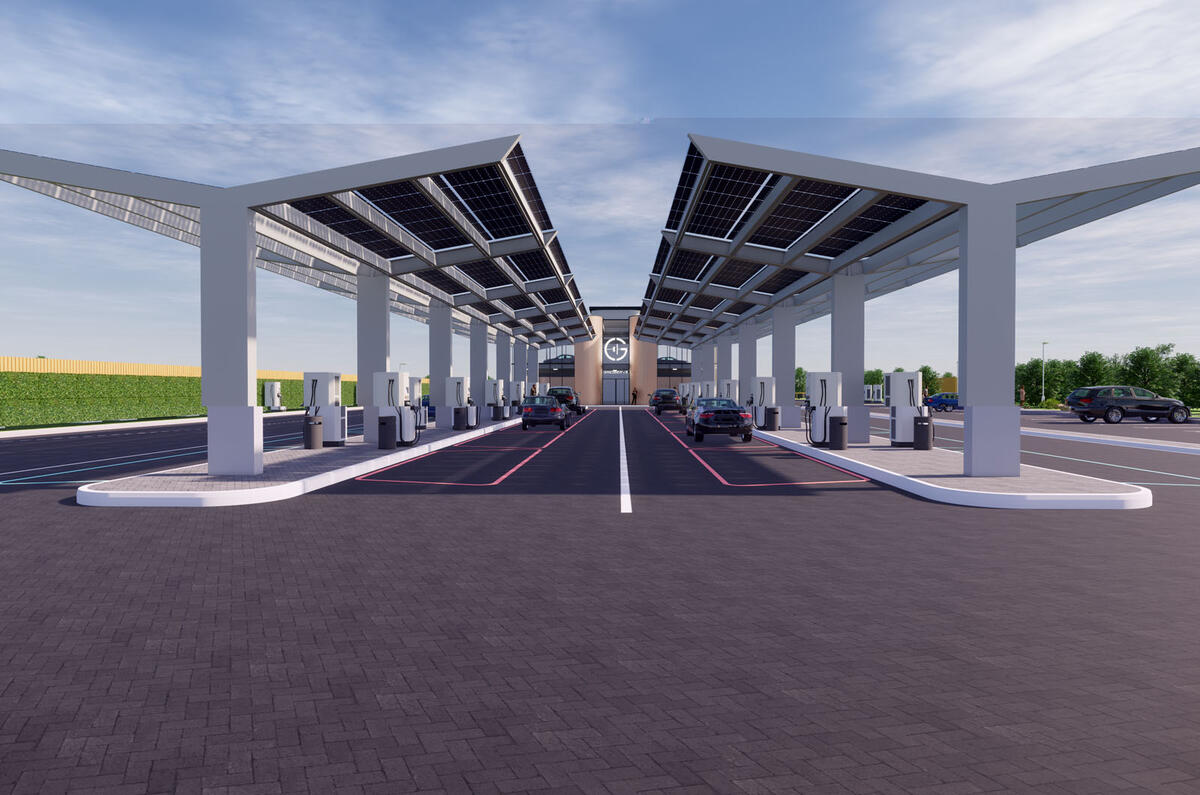Japanese technology giant Hitachi has invested several million pounds into British electric vehicle charging firm Gridserve as part of a move to speed up the mass adoption of EVs in the UK.
The ongoing investment, which so far stands at £5.6 million, will support the development of Gridserve's nationwide network of dedicated charging stations, with the first of its planned 100 sites set to open this summer. The two firms are also collaborating on plans for an electric bus network and financial incentives for EV buyers.
The first site to be built as part of the Gridserve's £1 billion scheme, near Braintree in Essex, will offer space for 24 vehicles to charge simultaneously at a rate of up to 350kW from its supercharger devices.
The company claims that customers will be able to charge within 20-30 minutes at first, but that waiting times will reduce as battery technology evolves. Currently, the only vehicle on sale that can charge at 350kW is the Porsche Taycan, with the Tesla Model 3’s 250kW compatability making it the second fastest.
Gridserve’s charging stations will be powered by a combination of roof-mounted solar panels, separate solar farms and integrated battery storage units, which, it claims, will ensure “carbon emission targets can be met, whilst also keeping prices low”.
Like a conventional motorway service station, the 2.5-acre Braintree facility, just off the A131, will contain a small supermarket, coffee shop and lounge area with wi-fi and meeting rooms.

It will also feature an ‘education centre for electric vehicles’ aimed at helping customers to “understand, test drive, and secure vehicles that are most suitable for them, with the ultimate aim of providing the confidence and support to transition to an all-electric future”.
Gridserve says it’s targeting locations that are near busy roads, towns, cities and major transport hubs for its charging stations. The firm hopes to have a nationwide network fully operational within the next five years, in line with the UK government’s bold plan to ban the sale of new combustion-engined cars by 2035.
The project has been partly funded by a £4.86m grant from Innovate UK, a government-backed agency that offers financial support to UK-based technology developers.
Toddington Harper, CEO of Gridserve, said: “We’ve designed our Electric Forecourts entirely around the needs of electric vehicle drivers, updating the petrol station model for a net-zero carbon future.















Join the debate
Add your comment
350 kW Porsche?
Incorrect, this is something they hope to achieve at some unspecified point in future.
Porsche charging "confusion"
"They can all charge from an 800V charger, if you can find one, at up to 270kW – taking it from 5% to 80% juice in a little over 20 minutes. There was talk, originally, of 350kW charge capacity, but Porsche says 350kW referred to partner Ionity’s charger outputs, not the car’s ability to take it: that was always meant to be 250kW-plus. Looking through Porsche’s newsroom back issues, this rings true, but there’s enough 350kW talk for it to have been inferred". That was taken (no pun inteded) from a recent review on the porshe taycan so why the mis-information about Tesla?
Rapid charging will degrade the battery in any case.
If its working flat out it
If its working flat out it can charge just over 1,000 cars a day. Imagine how many of these things we will need to charge the millions of cars on the UKs roads. Even with 24 bays for charging its only double what many petrol stations have, but they only need to be used for 3 to 5 minutes per fill, and will then give you hundreds of miles of range.
The article also suggests that it will get all its power from solar. In truth this place will have to draw nearly all its power from the grid surely? How many solar panels do you need even to charge 1 car?
If you cant plug in at home EVs are just going to be hard work to live with
Most people will charge at
As we've seen with the Saudis bumping up oil production, they know that the shelf life of their riches is very short indeed as we all start making the switch to electric.
artill wrote:
But then most people don't have a petrol pump at home whereas most people have electricity at home.
xxxx wrote:
But most people dont have parking bays at home. Most work places dont have car parks, and those that do, dont have charging ports in every bay.
Really
My statement stands, most people at home do have electricity and I know most people don't have a petrol pumps at home but even if just people with a drive ways buy BEV's it's a massive chunk of the market, and in a few years time supermarkets and work places will have power points too (several do already by the way, ours have several). I await your opinion when Volvo bring out a decent BEV